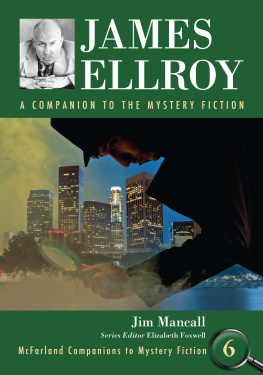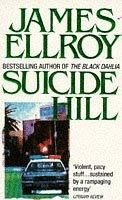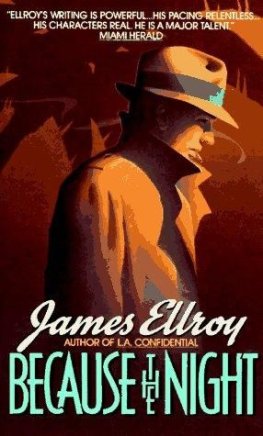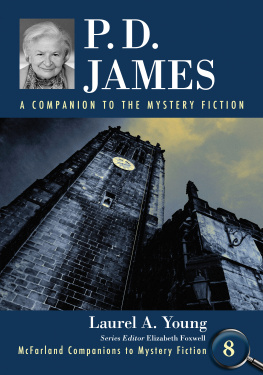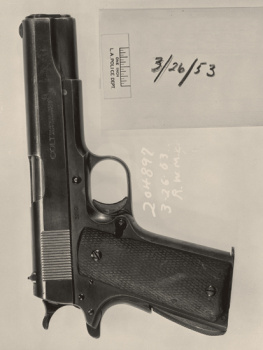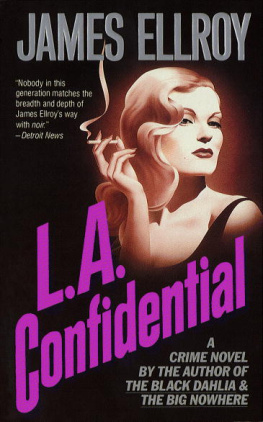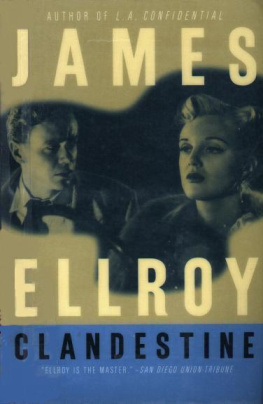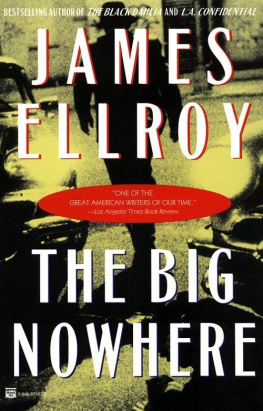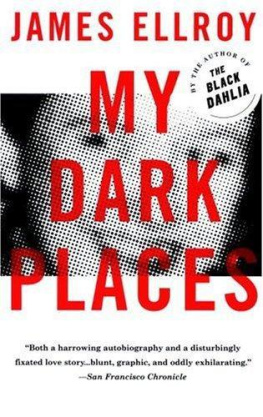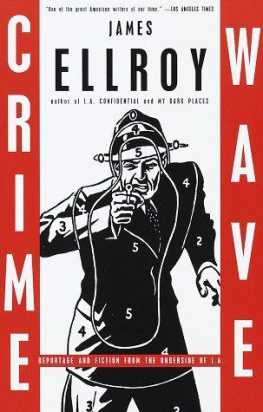MCFARLAND COMPANIONS TO MYSTERY FICTION
BY KATE MACDONALD
1. John Buchan (2009)
BY GINA MACDONALD with ELIZABETH SANDERS
2. E.X. Ferrars (2011)
BY ERIN E. MACDONALD
3. Ed McBain/Evan Hunter (2012)
BY ANNE-MARIE BELLER
4. Mary Elizabeth Braddon (2012)
BY LUCIA RINALDI
5. Andrea Camilleri (2012)
James Ellroy
A Companion to the Mystery Fiction
JIM MANCALL
McFarland Companions to Mystery Fiction, 6
Elizabeth Foxwell, series editor

McFarland & Company, Inc., Publishers
Jefferson, North Carolina
LIBRARY OF CONGRESS CATALOGUING DATA ARE AVAILABLE
BRITISH LIBRARY CATALOGUING DATA ARE AVAILABLE
e-ISBN: 978-1-4766-1393-2
2014 Jim Mancall. All rights reserved
No part of this book may be reproduced or transmitted in any form or by any means, electronic or mechanical, including photocopying or recording, or by any information storage and retrieval system, without permission in writing from the publisher.
On the cover: inset James Ellroy (photograph by Marion Ettlinger); detective and Los Angeles skyline (iStockphoto/Thinkstock)
McFarland & Company, Inc., Publishers
Box 611, Jefferson, North Carolina 28640
www.mcfarlandpub.com
To SED, for her love and encouragement.
Acknowledgments
Id like to acknowledge the many people who helped with this project. At Wheaton College, Connie Campana and Sam Coale encouraged me to keep going. When I had research questions, Pete Coco and Lauren Slinguff were very generous with their time and enthusiasm. Jana Vergados more than ably aided my research. There are many other wonderful colleagues whose friendship and humor helped me reach the finish line.
Id also like to thank Mrs. Ruth Solomkin for her warm encouragement and, of course, Elizabeth Foxwell for proposing the project and for her assistance and long forbearance. Finally, Id like to thank James Ellroy himself. His conversations with me deeply shaped my thinking about his work.
Preface
Who is James Ellroy?
It is an essential question, one that this volume hopes to answer and one that occurs to just about every reader who delves into Ellroys world. Is he the vainglorious, boastful Demon Dog of American literature, howling at the moon? Is he a racist, a homophobe, a misogynistic reveler in violence and gore? Or is he a deeply masterful writer, one who challenges readerly expectations and has transformed the conventions of crime fiction? As David Thomson put it in his review of Ellroys second memoir, The Hilliker Curse, is this a madman, a very smart guy pretending to be mad, or an astute trickster who has lost control of the trick?
Depending on the audience, the answer can be yes, yes, and yes. In fact, it is rare to come across an author who provokes so many and such strongly divergent opinions. Scholar Mike Davis, for example, calls Ellroy a fraud and a fascist (Davis, Interview 3940). In contrast, novelist Joyce Carol Oates calls the LA Quartet and the Underworld USA Trilogy by any measure among the most ambitious and accomplished crime fiction in the history of American literature. That is high praise indeed, especially from a writer of Oatess stature.
Part of what frustrates attempts to make sense of Ellroy is his own sense of showmanship. As Tim Rutten writes, theres the problem of [Ellroys] public persona, which is theatrical, exaggerated andby his own admissioncalculated to provoke with a whole variety of unfashionable political and social views. When Ellroy gives public readings, he is likely to begin with some version of the following riff:
Good evening, peepers, prowlers, pederasts, panty sniffers, punks, and pimps. Im James Ellroy, the demon dog, the foul owl with the death growl, the white knight of the far right, and the slick trick with the donkey dick.
He will then go on to introduce his booksmasterpieces alland proclaim that reading them will leave you reamed, steamed, and dry cleaned, tie dyed, swept to the side, true blued, tattooed and bah fongooed (qtd. in Wallace 120).
Yet Ellroy has a whole other side. As he tells interviewer Tom Lutz, his public persona is all an act ... its about 3 percent of who I am. Outside of the spotlight, Ellroy says that I feel rather deferential to people. If Im going to a party or meeting with a group of people, I would much rather not talk about myself ... if this were not an interview, and you and I were just sitting around having a cup of coffee, Id much rather hear about your life (Beatrice Interview 56). I can vouch for this myself. When I met with Ellroy in 2007, he was gracious, thoughtful, and genuinely interested in learning about my own life and opinions. However, Ellroy acknowledges that his outrageous public persona has worked, and as long as it continues to get me print, Ill continue to perform in an exuberant manner (Beatrice Interview 56). Even his politics may be part performance. In 2009, he told Rolling Stone that he espouses right-wing views to fuck with people (Woods 62). In fact, he calls George W. Bush the most disastrous American president in recent times and actually voted for Barack Obama (Woods 62). It should be noted, however, that in Shakedown, published in October 2012, James Ellroy vows to vote for Mitt Romney. Again, however, it must be asked: Is this James Ellroy the character, or the actual Ellroy?
To further complicate matters, Karina Beal suggests caution in accepting everything Ellroy tells us about himself as the truth. As Beal argues, Ellroys use of the confessional mode in his memoirshis candid acknowledgment of shameful thoughts and episodesis part of a long tradition in Western autobiography (90). At the same time, Ellroys memoirs own up to a long history of dishonest behavior, and thus the careful reader has to ask whether this appearance of honesty is only one more facet of Ellroys constructed persona (Beal 91).
So, who is James Ellroy? He is, above all, ambitious. In his Demon Dog mode, he tells interviewers that he is the greatest crime writer who ever lived. I am to the crime novel in specific what Tolstoy is to the Russian novel and what Beethoven is to music (Solomon 21). Ellroy says this with a wink, and we may shake our heads, bemused (or irritated) by Ellroys braggadocio, but there is a kernel of truth in this joke. Ellroys drive lifted him from a life of addiction and homelessness. It allowed him to write six novels while working as a golf caddy. It has spurred him continually to push at the boundaries of crime fiction. As he has become more successful, Ellroys novels have become more and more ambitious, and more and more challenging for readers. His main characters are rarely benevolent and often marginally likable. As he tells Steve Boisson, if theres one rule Id like to break, its the rule that says We need sympathetic characters to engender sympathy with our readers (27). Ellroy is not interested in this kind of sympathetic protagonist; in fact, in his conversation with Boisson, he goes on to say that he hates the cheap humanity inherent to the private-eye genre. I hate Raymond Chandlers Philip Marlowe and his 18,000 clones (Boisson 27). There are no heroes in Ellroys fiction; even his most sympathetic characters are deeply compromised, if not outright immoral. Scottish crime writer Ian Rankin says that you cant get much more damaged than an Ellroy hero (Wroe). Or, as Ellroy himself has put it many times, his books are about bad men doing bad things in the name of authority (Miller). Paraphrasing Chandlers famous comment that Hammett gave murder back to the kind of people who committed it for reasons, Ellroy has said that he wanted to give crime fiction back to the leg breakers of history, the soldiers of fortune, to bad white men, to racist shit-birds and the corrupt cops (Silet 241).
Next page
